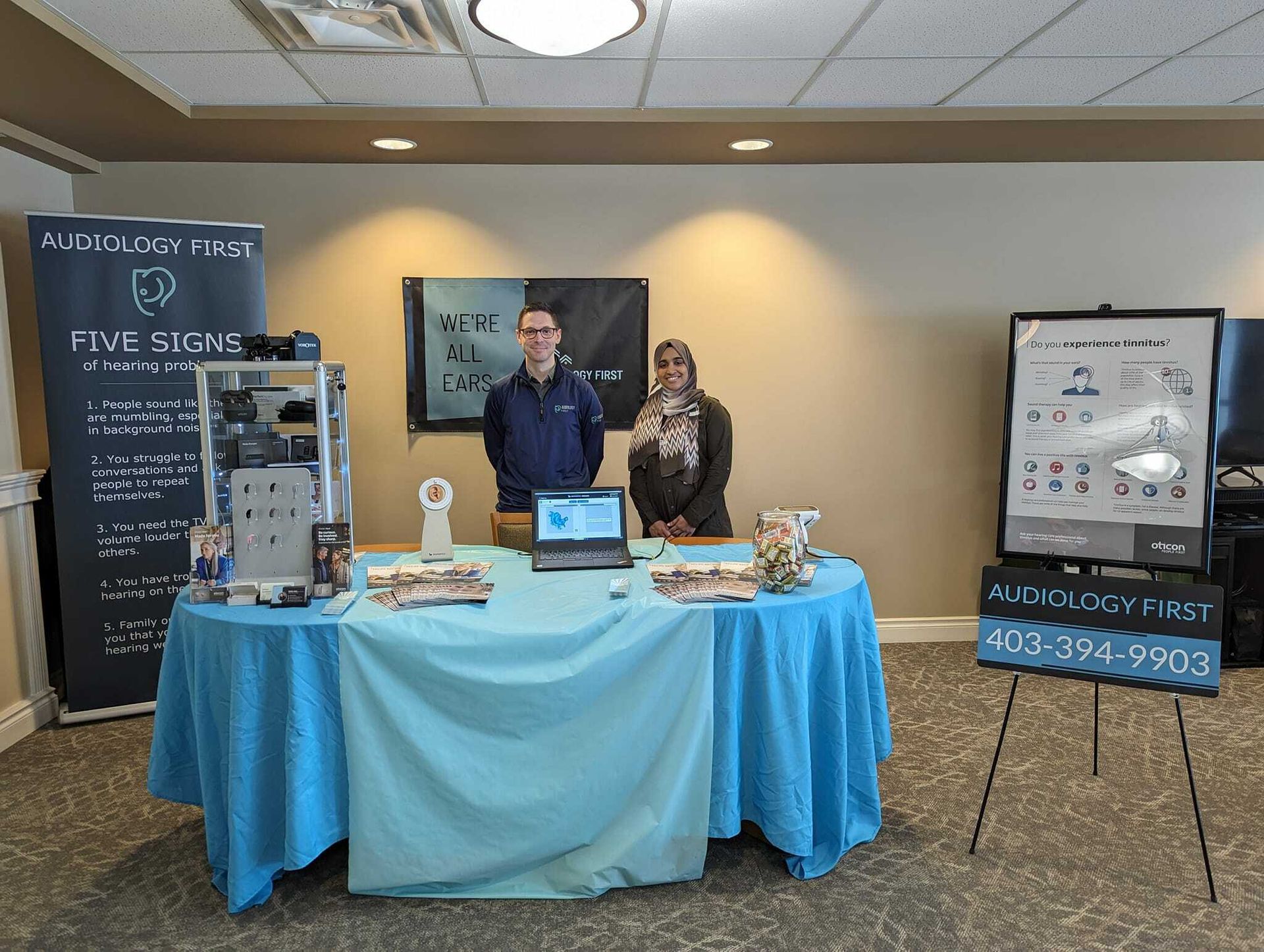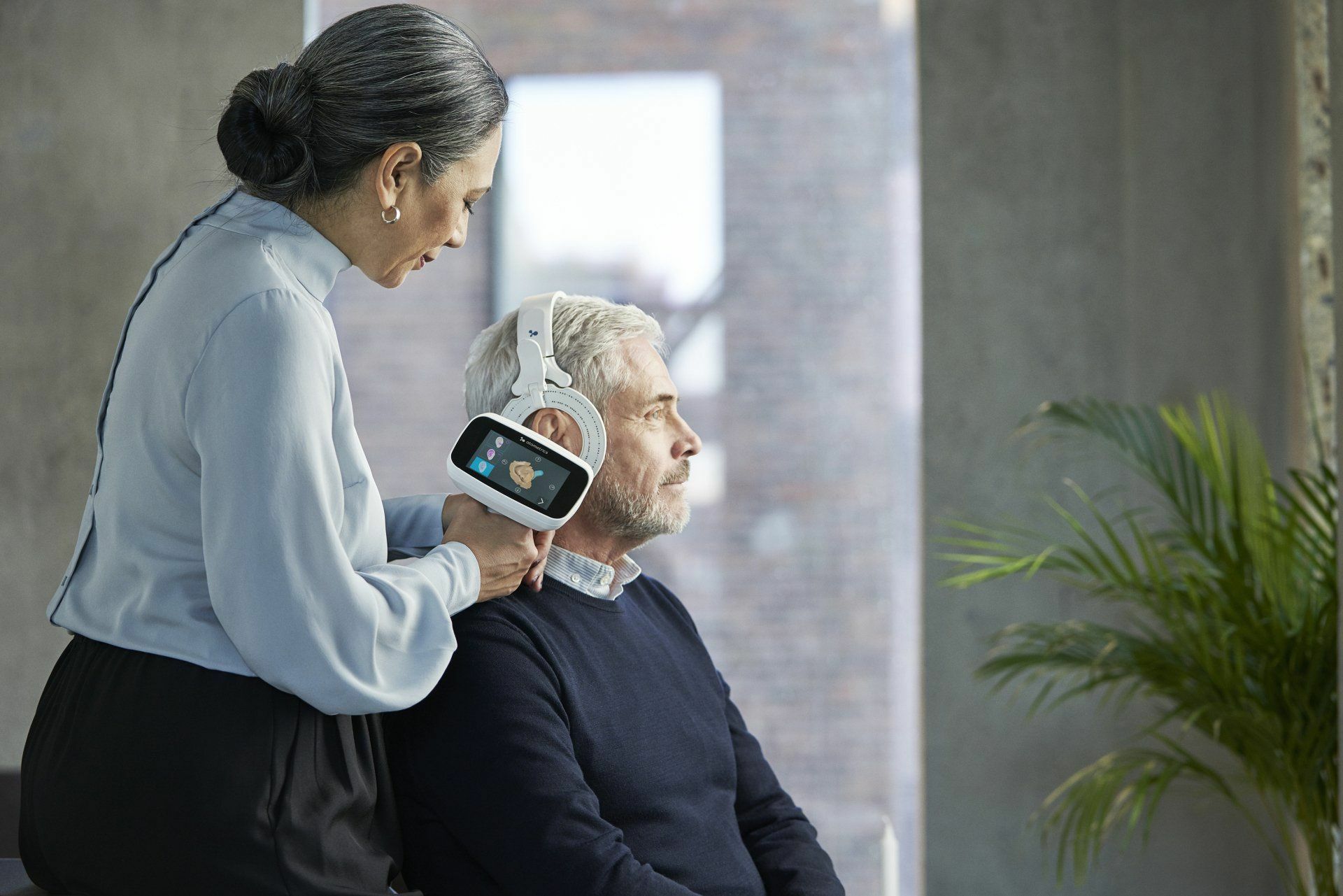Update on Hearing loss and Dementia
Update on dementia and hearing loss - March 2025

By Glenn Hole, Audiologist and Owner of Audiology First.
Main points in summary
- Hearing loss is prevalent, especially among seniors in Southern Alberta, potentially due to noise-heavy industries and an aging population.
- It leads to short-term issues like communication difficulties and tinnitus.
- Mid-term effects include social isolation, depression, and reduced quality of life.
- Long-term hearing loss is being researched for its potential link to cognitive decline and dementia.
- Research suggests a correlation between hearing loss and increased risk of dementia, but a direct causal link is not yet definitively proven.
- Hearing loss appears to be a modifiable risk factor for dementia.
- Hearing aids can mitigate some of the other negative impacts of hearing loss
- Some studies indicate that hearing aids may reduce cognitive decline, but more research is needed.
- Improving hearing is one of several healthy lifestyle choices that reduce the risk of dementia.
- The proper fitting and consistent use of hearing aids is essential to gain the full benefits.
- Audiology first is a clinic that focuses on evidence based hearing aid fittings.
Introduction
This blog post represents an update to an original post made in the springtime of 2024 last year on the topic of cognitive decline and hearing loss. This may be an important read for those who may have hearing loss, who may have hearing aids but are not currently using them, and for anyone interested in the topic of hearing loss and cognitive health.
Short term effects of age-related hearing loss.
Age related hearing loss is the most common type of hearing loss, and since it develops very gradually, it can be hard to notice at first. Noise exposure affects the hearing in a similar way to age related change.
Most forms of hearing loss reduce the fine details of sounds, rather than giving someone complete deafness. Because age or noise damage related hearing loss tends to damage the high-pitched hearing ability first, most patients with hearing loss tend to have the most trouble hearing children's voices, women’s voices or certain letter sounds like "s" and "f". Some of the first signs of hearing loss also include increasing difficulty following conversations in restaurants, misunderstanding what people say regularly, especially when multiple people are talking.
One common, everyday sign of hearing loss is turning up the volume on TV, radio, or other devices to hear clearly. Tinnitus is another common sign and symptom of hearing loss, where people experience ringing, buzzing, or hissing sounds in the ears.
Most people with hearing loss tend to underestimate the problem, while others around them have been noticing the problem for years (Kiely et al., 2012). A hearing test is recommended for anyone over the age of 65, whether they have noticed problems yet or not.
Mid term effects of hearing loss
Social withdrawal and loneliness are more common among those with hearing loss (Shukla A et al. 2020). Those with hearing loss also tend to suffer from other psychological and emotional difficulties such as depression, anxiety, lowered self-esteem, frustration, anger, and a sense of loss due to the inability to fully participate in conversations and activities.
Long Term effects of hearing loss
Research now suggests that in addition to the short and mid term effects of hearing loss, there are long terms effects of hearing loss. Social withdrawal, limited interpersonal interactions, relationship breakdowns, and poorer quality of life are all well documented consequences of hearing loss that is unmanaged and untreated (Kaland, Salvatore, 2002).
Managing the hearing problem can provide some defense against some of the short term, mid-term and long term effects of hearing loss. Decades of research confirms a strong association between hearing aid use and increased quality of life (Kitterick & Ferguson, 2018; Aviernos et al., 2024), however only about 30% of those aged 70 and above who could benefit from a hearing aid have ever tried one.
A hidden long term effect of hearing loss could be cognitive decline
Researchers have found additional reasons to consider fixing the hearing problem. Hearing loss appears to increase the risk of cognitive decline and dementia.
Why this is being researched?
As our population ages, the rates of dementia and cognitive decline will increase. The costs of care for those with cognitive dysfunction are already high, and are set to grow. For example, in the USA, the combined medical and caregiving costs associated with the care of all persons in the US with Alzheimer’s dementia were estimated to exceed $500 billion in 2020 and are projected to rise to $1.6 trillion (inflation-adjusted) by 2050 (Aranda et al, 2021).
In Canada, and many other countries around the world, scientists have been searching for ways to understand why dementia occurs, who is most vulnerable, and to maybe find ways to reduce or prevent dementia.
Hearing loss has long thought to be related to cognitive decline and has become one of the biggest areas of dementia and aging related research in recent years. A quick search listed 28,923 studies that have included information directly or indirectly relating to hearing loss on the brain since 1977. In 2024 alone there were 2118 studies!
What is this all this research telling us?
Some of the most important studies to date have shown that:
- 9% of all existing dementia cases may be associated with hearing loss (Livingstone et al., 2020)
- There is evidence for additional brain shrinkage in those with hearing loss compared to those without hearing loss (Wang et al., 2022).
- Researchers have found markers for Alzheimer’s disease in people with hearing loss before any diagnosis of Alzheimer's has been made (Wang et al., 2022).
- Individuals with mild, moderate, and severe hearing loss had a two-fold, three-fold, and five-fold increased risk of developing dementia, respectively, compared to those with normal hearing of the same age (Lin et al. 2023).
- Even mild hearing loss is associated with a 19% increased risk of developing dementia over a 10-year period compared to those of the same age without hearing loss (Wei et al 2017).
Based on the currently available research, correlational relationships between cognitive decline and hearing loss exist; and as rates of hearing loss increase, dementia and cognitive decline also seem to increase – in a predictable way. Then again, correlation isn’t always evidence of causation, and two things can seem related for unrelated reasons. Actual causative factors are difficult to identify for many reasons.
This raises an important question for those involved in hearing care.
Should hearing care providers share this information with out patients?
I feel that as audiologists should we raise awareness of these risks, and ensure we try and future proof or protect those who might be vulnerable to 'hearing-loss-related dementia', should THE causative mechanism linking the two be found and identified. Hearing aids should not be sold as 'dementia cures'. That is a big exaggeration of the reality. Hearing aids are likely to reduce some of the risk posed by the effects of hearing loss - and I think that is the only thing we should infer and share with patients.
Intuitively however, I feel that we already have evidence enough to have a good discussion of the risks of hearing loss related dementia, but that discussion should be provided with a great deal of context. As you can tell, finding the right words and ways to deliver that information is difficult and nuanced that a simple headline or slogan can ever deliver.
Additionally, it should be acknowledged that dementia is not the only potential risk of hearing loss. There may also be other unknown and unique effects of hearing loss on an individual. For example, untreated hearing loss has been associated with worse spatial awareness, and increased risk of falls. Hearing loss may be implicated in people not performing well at work, and not receiving adequate recognition or promotion. Hearing loss may cause people to feel inadequate or restricted in some way in meeting new people, or forming relationships with others. I feel that audiologists have a responsibility to care for patients with hearing loss, and while managing the risk of dementia is not the primary goal of managing hearing loss, I still feel a strong sense of responsibility to be proactive and protective against all of the risks a hearing problem might create.
Dementia & Hearing Loss – A mosaic of risks and possibilities.
Like many health conditions, combinations of different factors indirectly contribute to the chances of us developing a problem. In the case of dementia, it happens that the effects of hearing loss appears to be one of the biggest modifiable risk factors for dementia, but it is far from the only risk factor. Our individual circumstances lead to the formation of a ‘risk mosaic’ – a composite of risk factors that form how much chance there is of us developing a particular health condition.
Experts say that as much as 60% of the risk of dementia does not appear to be related to anything we could control or change, while the remaining 40% of our risk is made up by modifiable health and lifestyle factors. Hearing loss is considered a modifiable risk factor or hearing loss.
Non-modifiable risks are things like aging, our environment, our genetics, and many other things that have not yet been identified by research.
Some good news - Some of our risk can be changed.
Research has shown that acting or modifying certain aspects of our lifestyles, taking care of health problems, such as treating diabetes, avoiding head injuries, treating hearing loss, starting an exercise program, or even changing your diet all seemed to directly reduce the risk of dementia developing.
Some of the items on our ‘risk mosaic’ therefore can be replaced or altered to lower our overall risk of developing dementia. Not only that, but there are major short term and mid term benefits to our health and wellbeing by managing our modifiable risk factors for dementia. Hearing loss is not the only modifiable risk, but it appears to be the biggest contributing risk factor for dementia.
The mechanism - The theories linking Hearing Loss & Dementia
There are several plausible mechanisms explaining the hearing-cognition relationship, divided into causal mechanisms (how hearing loss might cause dementia) and common mechanisms (factors affecting both hearing loss and dementia).
Causal Mechanisms – How hearing loss might cause dementia.
- Depletion of Cognitive Reserve: Hearing loss increases cognitive load, potentially exhausting cognitive reserve. Cognitive reserve helps individuals cope with brain pathology. Hearing loss may force the brain to allocate more resources to sound processing, reducing resources for other cognitive functions, leading to earlier dementia symptoms (Tun et al, 2009).
- Social Isolation: Hearing problems can lead to social isolation, increasing dementia risk (Strawbridge et al, 2000, Mick et al 2014). Social isolation impairs communication and reduces social support, which is crucial for healthy aging. Preventing social isolation is important in aural rehabilitation to promote healthy aging and prevent cognitive decline.
- Changes in Brain Structure: Studies show older adults with hearing loss have decreased brain volumes, particularly in areas crucial for language processing compared to those with normal hearing (Peelle et al, 2011). This reduction in brain volume is thought to be related to under-use of the hearing areas of the brain. This may affect cognitive processes and increase dementia risk (Chern & Golub, 2019).
Common Mechanisms – Shared that could cause hearing loss AND dementia
- Vascular degeneration: Deterioration of blood vessels may contribute to both hearing loss and dementia. Insufficient blood flow to the inner ear and brain can cause and contribute to both hearing loss and cognitive decline. However, some studies found an association between hearing loss and dementia even after adjusting for vascular risk factors.
- Other Neuropathologic Processes: A common process might affect both the brain and hearing structures, causing both dementia and hearing loss at the same time. However, no such process has yet been identified.
- Additional Considerations: As stated above, the relationship between hearing and dementia may be multifactorial, involving several mechanisms.
Weaknesses in the research
There are some confounding problems when it comes to making the assertion that hearing loss causes dementia, and that hearing aids can fix or prevent dementia. It is important to read carefully around the topic, and not accept all information on face value. Research articles can be difficult to read and may not always provide clear conclusions. Here are some of the main issues with the research.
Hearing difficulties can mimic dementia.
Tests that measure cognitive function, or screening tests for dementia must be carefully designed as to not represent the effects of hearing loss as a sign that a person has dementia. Physicians performing screening tests for dementia must work around existing sensory impairments like hearing loss, so that hearing loss is not mistaken for dementia. Memory problems are common in people with hearing loss, even if they do not have dementia. Memories of conversations may be difficult if they were only partially heard. It is important to have a good understanding of the way data for these studies was collected, and whether existing sensory problems could have contributed to poor scores. The best research appears to have eliminated potentially confounding factors.
Do hearing aids actually help?
Some studies have found it difficult to identify whether treating age related hearing loss with hearing aids can alter dementia. Some studies used existing data to compare two groups of people with hearing loss, those who did and those who did not acquire hearing instruments. Research shows that those who wore hearing instruments had better cognitive function, however we cannot assume that the hearing improvement was the only reason for this. They could have been advantaged with regards to the risk of developing dementia in several ways. For example, people with higher levels of education, and higher levels of income could afford hearing aids more easily. These same people may have had access to a better diet, had less exposure to environments that could put them at risk of dementia. They could have had better sleep throughout their lives. As a result of having a better quality of life in several other areas, unrelated to hearing loss, they could have had fewer mental health related concerns, had more opportunity to exercise, and more opportunity to socialize.
However the consistent use of hearing aids can be much lower than the recommended levels, especially amongst older adults who may already have dementia. This may be especially true for those in long term care facilities where hearing aid uses become dependent on others for consistent use (Cohen-Mansfield J, Taylor JW, 2004).
· Hearing aids require extensive care and maintenance to keep providing the right level of benefit to the patient.
· Those in long term care for dementia often have problems with mismanagement of hearing aids.
· Batteries have often run out for days or weeks on end.
· Hearing aids can be labelled be care workers as ‘expensive personal devices’ and kept in a drawer or cupboard rather than worn to avoid loss of the devices.
These issues can be created by a general lack of education on hearing aids, time or ability to provide hearing aid care for someone else. This can mean that cognitive performance data gathered on hearing aid users and the potentially beneficial effects of hearing aid use may be hindered by low exposure to the sound and high levels of downtime with the hearing aids. Improvements in hearing aid management for those most vulnerable to dementia will provide a clearer view of how hearing aids can help with dementia.
Ethics: How can we find out if hearing loss does cause dementia?
Research is sometimes fraught with real ethical problems. It would not be ethical to create a control group of vulnerable non-hearing aid users, and compare their cognitive outcomes over 10 years against hearing aid users who had the advantage of using hearing aids over time? Such a study would not be allowed by an ethics commission. Withholding beneficial treatment for the purpose of research is wrong, and most researchers, patients, advocacy groups, and policymakers agree that hearing loss is a problem we should be treating in the immediate timeframe.
There is also no need to really study this issue further than we already have, at least in terms of identifying the correlation between hearing loss and dementia. We already have a large control group to study. As mentioned earlier, there are many people who need hearing aids do not actively seek them out, and against our best clinical advice, voluntarily avoid hearing aid use for as long as possible. This is where most of our correlational findings seem to be coming from.
Controlling what we can control.
To state that ‘you will get dementia unless you buy a hearing aid’ is highly unprofessional and untrue. Yet, to state that, ‘research appears to show that hearing loss may contribute to the development of dementia’ is a fair and correct statement.
Taking control of multiple risk factors within our control is the best way to reduce our risk of dementia. The Alzheimer's society in the UK has a great list of lifestyle choices and habits that can be adopted to reduce the risk of dementia.
https://www.alzheimers.org.uk/about-dementia/managing-the-risk-of-dementia/reduce-your-risk-of-dementia
They include:
- Getting regular exercise
- Reducing alcohol intake
- Quitting smoking
- Managing mental health problems
- Making efforts to be socially involved.
- Manage long term health conditions:
- Obesity
- Cholesterol
- High blood pressure
- Diabetes
- Protect yourself against head injuries
- Managing hearing loss
- Managing vision problems
- Trying to reduce exposure to air pollution.
Hearing Aids & Their Potential to Help
The most common and successful treatment for hearing loss is well-fitted hearing aids. These days, hearing aids are sleek, barely noticeable, ear-level devices with all the automation and convenience a person might need to make things easier. In one large study published in the Lancet in 2023, hearing aid use was associated with a
48% reduction in cognitive decline over three years compared to no hearing aid use at all. When properly and expertly fitted, hearing aids may reduce the risk of hearing loss-related dementia.
Audiology First - True Hearing Care in Lethbridge & Southern Alberta
As Lethbridge's only independent audiology clinic, we are committed to following best practices and providing a level of care recognized province wide. We fit every hearing aid with the brain in mind and apply our own evidenced-based research to continually push the field forward.
There’s a big difference between all-inclusive hearing healthcare and a clinic that is simply selling hearing aids. Audiology First is that difference, and we always strive to provide our patients with the latest technology and treatment approaches.
Evidence-Based Hearing Aid Fittings at Audiology First
If you have hearing aids and are not currently using them, the clinic that provided them may not have followed the most up-to-date and best hearing care practices. Satisfaction with hearing aids can be quite low, likely since only about 30% of hearing aids dispensed are fitted with evidence-based methods.
If you need or wear hearing aids, we will ensure you get the most out of them. We will also retune hearing aids purchased elsewhere—at no charge.
Come visit us today at Audiology First to take back your hearing health and find the solution that is right for you.
References
1. Aranda MP, Kremer IN, Hinton L, Zissimopoulos J, Whitmer RA, Hummel CH, Trejo L, Fabius C. Impact of dementia: Health disparities, population trends, care interventions, and economic costs. J Am Geriatr Soc. 2021 Jul;69(7):1774-1783. doi: 10.1111/jgs.17345. PMID: 34245588; PMCID: PMC8608182.
2. Avierinos, R. J., Beukes, E., Manchaiah, V., Oosthuizen, I., le Roux, T., & Swanepoel, D. W. (2024). Meaningful life changes following hearing aid use: a qualitative user perspective. International Journal of Audiology, 1–10. https://doi.org/10.1080/14992027.2024.2376043
3. Chern A, Golub JS. Age-related Hearing Loss and Dementia. Alzheimer Dis Assoc Disord. 2019 Jul-Sep;33(3):285-290. doi: 10.1097/WAD.0000000000000325. PMID: 31335455; PMCID: PMC7749722
4. Cohen-Mansfield J, Taylor JW. Hearing aid use in nursing homes. Part 1: Prevalence rates of hearing impairment and hearing aid use. J Am Med Dir Assoc. 2004 Sep-Oct;5(5):283-8. PMID: 15357885.
5. Gill Livingston, Jonathan Huntley, Andrew Sommerlad, David Ames, Clive Ballard, Sube Banerjee, Carol Brayne, Alistair Burns,Jiska Cohen-Mansfield,Claudia Cooper,Sergi G Costafreda,Amit Dias,Nick Fox,Laura N Gitlin,Robert Howard,Helen C Kales,Mika Kivimäki et al. Dementia prevention, intervention, and care: 2020 report of the Lancet Commission. The Lancet 8–14 August 2020 vol. 396 issue 10248 Licensed Content Pages 34 https://www.ncbi.nlm.nih.gov/pmc/articles/PMC7392084/
6. https://publichealth.jhu.edu/2023/new-study-links-hearing-loss-with-dementia-in-older-adults
7. Kiely KM, Gopinath B, Mitchell P, Browning CJ, Anstey KJ. Evaluating a dichotomized measure of self-reported hearing loss against gold standard audiometry: prevalence estimates and age bias in a pooled national data set. J Aging Health. 2012;24(3):439-458. doi:10.1177/0898264311425088
8. Kitterick PT, Ferguson MA. Hearing Aids and Health-Related Quality of Life in Adults with Hearing Loss. JAMA. 2018;319(21):2225–2226. doi:10.1001/jama.2018.5567
9. Lin FR, Pike JR, Albert MS, Arnold M, Burgard S, Chisolm T, Couper D, Deal JA, Goman AM, Glynn NW, Gmelin T, Gravens-Mueller L, Hayden KM, Huang AR, Knopman D, Mitchell CM, Mosley T, Pankow JS, Reed NS, Sanchez V, Schrack JA, Windham BG, Coresh J; Hearing intervention versus health education control to reduce cognitive decline in older adults with hearing loss in the USA (ACHIEVE): a multicentre, randomised controlled trial. ACHIEVE Collaborative Research Group. Lancet. 2023 Jul 17:S0140-6736(23)01406-X. doi: 10.1016/S0140-6736(23)01406-X. Online ahead of print. PMID: 37478886 https://www.thelancet.com/journals/lancet/article/PIIS0140-6736(23)01406-X/abstract
10. Loughrey DG, Kelly ME, Kelley GA, Brennan S, Lawlor BA. Association of age-related hearing loss with cognitive function, cognitive impairment, and dementia: a systematic review and meta-analysis [published online December 7, 2017]. JAMA Otolaryngol Head Neck Surg. doi:10.1001/jamaoto.2017.2513 https://jamanetwork.com/journals/jamaotolaryngology/fullarticle/2665726
11. Marcos-Alonso, S., Almeida-Ayerve, C. N., Monopoli-Roca, C., Coronel-Touma, G. S., Pacheco-López, S., Peña-Navarro, P., Serradilla-López, J. M., Sánchez-Gómez, H., Pardal-Refoyo, J. L., & Batuecas-Caletrío, Á. (2023). Factors Impacting the Use or Rejection of Hearing Aids-A Systematic Review and Meta-Analysis. Journal of clinical medicine, 12(12), 4030. https://doi.org/10.3390/jcm12124030
12. Mary Kaland and Kate Salvatore (2002) The Psychology of Hearing Loss. The ASHA Leader Volume 7, Number 5 Pages 4-15 https://doi.org/10.1044/leader.FTR1.07052002.4
13. Mick P, Kawachi I, Lin FR. The association between hearing loss and social isolation in older adults. Otolaryngol Head Neck Surg. 2014;150(3):378–384.
14. Peelle JE, Troiani V, Grossman M, Wingfield A. Hearing loss in older adults affects neural systems supporting speech comprehension. J Neurosci. 2011;31(35):12638–12643
15. Saunders GH, Lewis MS, Forsline A. Expectations, prefitting counseling, and hearing aid outcome. J Am Acad Audiol. 2009 May;20(5):320-34. doi: 10.3766/jaaa.20.5.6. PMID: 19585963. https://pubmed.ncbi.nlm.nih.gov/19585963/
16. Shukla A, Harper M, Pedersen E, Goman A, Suen JJ, Price C, Applebaum J, Hoyer M, Lin FR, Reed NS. Hearing Loss, Loneliness, and Social Isolation: A Systematic Review. Otolaryngol Head Neck Surg. 2020 May;162(5):622-633. doi: 10.1177/0194599820910377. Epub 2020 Mar 10. PMID: 32151193; PMCID: PMC8292986.
17. Strawbridge WJ, Wallhagen MI, Shema SJ, Kaplan GA. Negative consequences of hearing impairment in old age: a longitudinal analysis. Gerontologist. 2000 Jun;40(3):320-6. doi: 10.1093/geront/40.3.320. PMID: 10853526.
18. Tun PA, McCoy S, Wingfield A. Aging, hearing acuity, and the attentional costs of effortful listening. Psychol Aging. 2009;24(3):761–766.
19. Wang HF, Zhang W, Rolls ET; Alzheimer's Disease Neuroimaging Initiative; Li Y, Wang L, Ma YH, Kang J, Feng J, Yu JT, Cheng W. Hearing impairment is associated with cognitive decline, brain atrophy and tau pathology. EBioMedicine. 2022 Dec;86:104336. doi: 10.1016/j.ebiom.2022.104336. Epub 2022 Nov 7. PMID: 36356475; PMCID: PMC9649369. https://pubmed.ncbi.nlm.nih.gov/36356475/
20. Wei J, Hu Y, Zhang L, Hao Q, Yang R, Lu H, Zhang X, Chandrasekar EK. Hearing Impairment, Mild Cognitive Impairment, and Dementia: A Meta-Analysis of Cohort Studies. Dement Geriatr Cogn Dis Extra. 2017 Dec 21;7(3):440-452. doi: 10.1159/000485178. PMID: 29430246; PMCID: PMC5806170.








